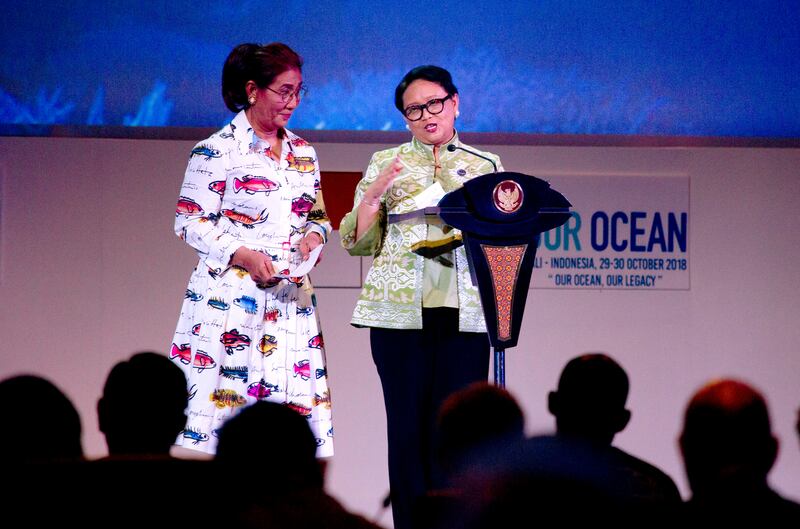Women and gender-equality advocates in Indonesia are crying foul about male dominance in President Prabowo Subianto’s jumbo-sized cabinet.
There are only 14 women in the newly inducted leader's cabinet of 104 ministers and deputy ministers. That equals 13.46%, although women make up about 49% of Indonesia's population of close to 280 million people.
While veteran Finance Minister Sri Mulyani Indrawati was able to retain her influential post, critics view the under-representation of women in politics as emblematic of persistent challenges for gender equality in Indonesia.
By contrast, women were better represented during the first term of Prabowo’s immediate predecessor, Joko “Jokowi” Widodo, who was seen as a progressive when he was first elected president. From 2014 to 2019, there were eight women in Jokowi’s 34-member cabinet.
Among them was Retno Marsudi, the globe-trotting foreign minister during Jokowi's two terms, who was replaced by Prabowo with a man.
For Indonesian women, the hope is that their gender’s representation in high-ranking government positions will translate into tangible change.
Women and gender-rights advocates who were interviewed by BenarNews said they wanted to see more opportunities and safeguards for women, particularly in the area of jobs, education, and safety.
“I just hope things get better,” said Olivia Rahmi, a 42-year-old job-seeker from Jakarta who was laid off in 2021 during the COVID-19 pandemic.
“It would be a huge help if they focused more on future generations of women who will be entering the workforce,” she said. “My hope is that our needs as women get more attention, for our welfare and well-being.”

The question of economic opportunity resonates deeply for many Indonesian women, particularly those in lower-income brackets.
Indonesia’s post-pandemic labor market has been challenging for women to navigate. Many sectors either lack protections for female workers or have limited options for women over a certain age.
Agnes Herlina, a 43-year-old ride-hailing driver and single mother, described the daily struggle of making ends meet.
“The orders are fewer now, and earnings are down,” she told BenarNews.
“I used to work as a cashier and receptionist, but finding work has been near impossible since the pandemic. Age discrimination is a problem for women.”
Despite these challenges, she remains focused on the task at hand: earning a living.
“For me, it’s about making money, not politics. Who the president is or who the ministers are doesn’t matter – what matters is putting food on the table,” she told BenarNews.
‘We can do just as much’
Sayuti Nafisah, an 18-year-old marketing representative, viewed Sri Mulyani, the finance minister, as proof that “a woman can be just as capable as any man.”
Sri Mulyani has held the finance portfolio across three presidencies: under Susilo Bambang Yudhoyono, Jokowi, and now Prabowo. She has also served as an IMF executive director and World Bank managing director.
In Sayuti’s opinion, gender equality remains a critical issue in Indonesia, Southeast Asia’s most populous country.
“Some men still see women as weak, as if we can’t do anything. But we can do just as much as anyone else. We just need the opportunities,” she said. “It’s important to show that women can hold leadership positions and not be looked down upon.”

Indonesia has seen a gradual increase in female representation in politics, thanks to the introduction of a 30% minimum quota for women legislative candidates.
In the current House of Representatives (DPR), women hold 127, or 22%, of its 580 seats – an increase of less than 1% from the previous legislature.
Prabowo’s promise
During a presidential debate in February, Prabowo, a former army general, pledged to protect women’s rights and promote gender equality, if elected.
“Women play a vital role in the development of our nation. My focus will be on improving nutrition and providing food for pregnant women,” Prabowo said.
He also highlighted the need for equal opportunities for women in education, announcing plans to establish integrated model schools across Indonesia’s districts where women would have the same opportunities as men.
While leaders like Sri Mulyani are seen as trailblazers, there’s skepticism among women about the long-term effects of their representation.
Gender rights activists have expressed frustration at the limited influence that female ministers might wield.
“Except for Sri Mulyani, who is recognized for her expertise, most women in the cabinet are in roles related to women’s affairs,” said Mike Verawati Tangka, secretary general of the Indonesian Women’s Coalition.
“This appears to be more about political tokenism than merit,” she told BenarNews.
Mike called for the inclusion of women based on their expertise.
“We have many qualified women, including academics and technocrats, who can contribute significantly,” she noted.
Shifa Salsabila, a 20-year-old psychology student, pointed to a larger issue: the uneven empowerment of women throughout Indonesia.
“In Jakarta, there are programs and initiatives supporting women’s empowerment, but for many women in rural areas, these opportunities are still out of reach,” she said. “For some, even accessing education is a struggle.”

Indonesia has seen female ministers who have stood out for their bold policies, and the public often recalls figures like Susi Pudjiastuti, the former fisheries minister, who was known for being tough on illegal fishing.
During her tenure, Pudjiastuti oversaw the destruction of hundreds of foreign vessels, leading to a 64% drop in illegal fishing practices by 2018, according to the government.
Her bold stance drew international attention, including a message of “serious concern” conveyed by China after Indonesia blew up 41 fishing boats, including a Chinese vessel, in 2015.
“She didn’t compromise,” said Muhammad Husni Husein, a 62-year-old entrepreneur. “If foreign ships were caught fishing illegally, she’d have them burned.”
